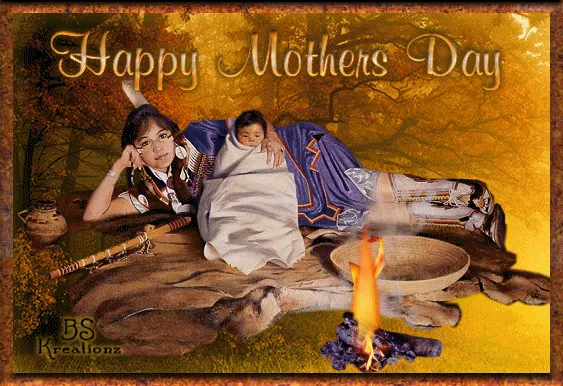The Date of Native American Mother’s Day holds cultural significance and provides a unique perspective on celebrating the maternal figures in Native American communities.
While it aligns with the traditional Mother’s Day observed in the United States, it often carries distinctive rituals and traditions that reflect the rich heritage of Native American cultures. This article, 49native delves into the specific date of this special occasion, shedding light on the meaningful customs associated with Native American Mother’s Day.
What Is The Date Of Native American Mother’s Day?

In the heart of Lakota culture, the word for mother is “Ina.” Ina was the embodiment of many “firsts” – first connection to the world, the first source of nourishment, the first bond, love, healer, teacher, and friend. Admiration for mother was unwavering, but it was only when became a mother myself that truly grasped the magnitude of her sacrifices.
Ina, a Sicangu and Oglala Lakota, embarked on a transformative journey at the tender age of fourteen. Leaving her Lakota homelands, she ventured to a prestigious New England boarding school.
Her bravery and brilliance drove her pursuit of opportunities beyond what her South Dakota school could provide. As one of just two American Indian students in her new school, she used the rich history and real-life experiences of her people to educate her peers and teachers about the immense struggles Native Americans endured at the hands of white settlers and the federal government

Though effortlessly formed friendships, the stark contrast between cultural and physical identity and that of classmates was always palpable. While navigating these social circles, it never struck how isolated mother may have felt as a teenager, and later as a mother and wife living far from her tiospaye (family) in father’s home state of Maryland.
This journey delves into the intersection of our shared experiences, celebrating the strength and resilience of Lakota mothers like own, and weaving together a narrative of cultural identity, challenges, and the enduring bond between mothers and daughters.
Is there a Native American day in the US?

Indigenous Peoples Day has been a subject of growing recognition and celebration, but is it officially designated as a federal holiday? While it may not hold the status of a federal holiday, it carries profound significance in many regions across the United States. This article will explore the status of Indigenous Peoples Day, its significance, and its evolving presence in American culture.
State-Level Recognition
Although Indigenous Peoples Day is not classified as a federal holiday, it has gained considerable traction at the state level. Notably, 17 states, including Washington, South Dakota, and Maine, along with the District of Columbia, have introduced holidays dedicated to honoring Native Americans.
Many of these state-level observances coincide with the second Monday in October, which was traditionally Columbus Day. In some instances, Indigenous Peoples Day has replaced Columbus Day or is celebrated in conjunction with it.

Local Celebrations
Beyond the state level, numerous cities and school systems across the nation have adopted Indigenous Peoples Day. These local celebrations provide a platform for communities to learn about and honor the indigenous cultures that are an integral part of American history.
Emerging Support in Legislation
In recent developments, Indigenous Peoples Day has garnered the support of lawmakers at the federal level. This year, both Anchorage and Phoenix officially recognized Indigenous Peoples Day as a holiday.
Furthermore, a group of U.S. lawmakers recently announced the reintroduction of legislation aimed at replacing Columbus Day with Indigenous Peoples Day as a federal holiday. This legislative initiative underscores the growing movement to acknowledge and celebrate the rich heritage of Native Americans.
While Indigenous Peoples Day may not be a federal holiday in the traditional sense, it is increasingly recognized and celebrated at both the state and local levels, reflecting a broader shift in acknowledging the importance of indigenous cultures in American history and society.
Read more: Compilation Of Native American Ceremony Performed In The Dry Season
Is today mothers day for hispanic?

Mother’s Day in the United States is widely recognized as the second Sunday in May. However, for individuals of Mexican, Salvadoran, and Guatemalan heritage, a cherished celebration known as Dia de la Madres takes precedence, landing on the fixed date of May 10.
This tradition, deeply rooted in cultural heritage, is a heartfelt homage to maternal figures, passed down through generations, and offers a unique perspective on the art of celebrating motherhood.
A Tradition of Love and Respect
Dia de la Madres, as celebrated in Mexican, Salvadoran, and Guatemalan communities, is a day marked by the gathering of families to pay sincere respect to their beloved mothers. It goes beyond mere appreciation; it is an occasion to recognize the extraordinary sacrifices and unwavering resilience that mothers exhibit.
On this special day, families unite to shower their mothers with the same boundless love and adoration that they have selflessly bestowed upon them.
The Cultural Significance

Understanding the cultural significance of Dia de la Madres is key to appreciating its importance in Mexican culture and beyond. This celebration transcends borders and brings together people of Mexican, Salvadoran, and Guatemalan descent, fostering a sense of unity and shared heritage. It emphasizes the values of family, respect, and the enduring influence of maternal guidance.
Traditional Celebrations
Dia de la Madres is celebrated with various customs and traditions that are unique to each family and community. While the core essence of the celebration remains the same, the specifics can vary. Families come together to create memorable moments, often involving heartfelt gestures such as cooking favorite meals, offering gifts, or organizing outings to honor their mothers.
Preserving the Legacy
What makes Dia de la Madres truly exceptional is its intergenerational nature. This celebration is not just an annual event but a tradition that has been handed down from one generation to the next. It embodies the idea of preserving cultural values and ensuring that the profound respect and love for mothers remain an enduring legacy.
Dia de la Madres is more than a date on the calendar; it is a testament to the deep love and respect that Mexican, Salvadoran, and Guatemalan communities hold for their mothers. It is a day where traditions are treasured, and bonds between families are strengthened, all in honor of the remarkable women who have played an integral role in shaping their lives.
How mothers day is celebrated in america?

Mother’s Day (IWD) is an annual celebration held on the second Sunday of May, dedicated to showing heartfelt appreciation for the remarkable women who have played an integral role in our lives. While it initially began as a movement advocating for world peace, it has since transformed into a joyous occasion to acknowledge and celebrate the tireless efforts of mothers in their everyday endeavors.
A Day to Cherish
On Mother’s Day, children and families come together to express their gratitude and affection for their mothers. This can take the form of preparing a special breakfast, presenting vibrant bouquets of flowers, and showering them with small, meaningful surprises. It’s a day when the world collectively pauses to honor the love, care, and dedication that mothers selflessly provide.
The Origins of Mother’s Day

The concept of Mother’s Day was first introduced in the United States in 1908 by Anna Jarvis, who sought to pay tribute to her own mother’s unwavering love and devotion. The year 2014 marked the centenary of Mother’s Day in the United States. From its inception, the celebration has grown into a day of profound significance. It is the one day each year when mothers are universally recognized and, importantly, relieved from their daily chores.
A Day to Dine Out
Mother’s Day holds a special place in the hearts of many, making it a peak day for restaurants. On this occasion, families come together not only to appreciate their mothers but also to give them a well-deserved break from their daily routines. Dining out on Mother’s Day has become a beloved tradition, and restaurants often offer special menus to make the day even more memorable.
Mark Your Calendars
This year, Mother’s Day falls on Sunday, May 11th, providing a perfect opportunity to make your mother feel cherished and valued. You can craft a heartfelt Mother’s Day card, bring her a bouquet of her favorite flowers, or serenade her with her beloved tunes. The possibilities for making this day special are as diverse as the love that mothers provide.
Mother’s Day is more than a mere date on the calendar; it’s a profound expression of gratitude and admiration for the women who have dedicated their lives to nurturing their families. It’s a day to cherish and appreciate, to pamper and spoil, and to create lasting memories that honor the immeasurable love of mothers.

